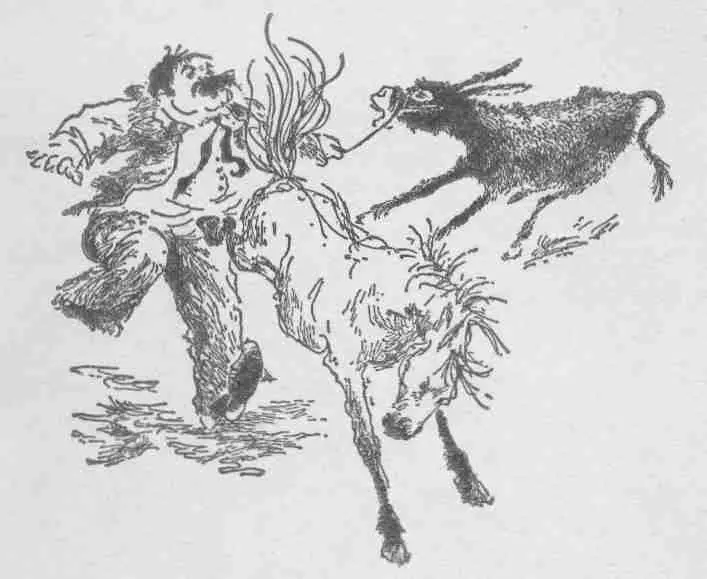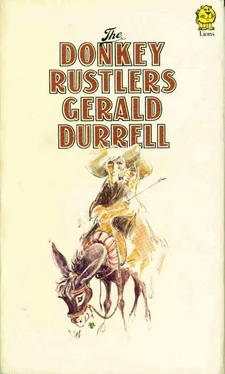As they had anticipated, Mayor Oizus, Papa Nikos and many other members of the village had just come from their siestas and had gathered round the tables at the café to discuss the burning question — when they would get information from the Communists as to the whereabouts of their donkeys. They were having a long and very complicated argument as to whether Communists could read or not when Amanda, perspiring profusely, came running into the village square.
“Mayor Oizus, Mayor Oizus,” she gasped, “we’ve found them.” She flung herself panting and exhausted into the Mayor’s lap.
“Found what, my golden one?” inquired the Mayor, startled.
It was obvious, however, from Amanda’s incoherence that she was in no condition to answer him, so they plied her with glasses of wine and patted her back and made reassuring noises until she had regained her breath.
“The donkeys,” gulped Amanda at last. “We’ve found them.”
The effect of this statement was electric. The Mayor rose to his feet spilling Amanda on to the floor and knocking over the table which held twelve ouzos and five cups of coffee.
“What?” he asked of the prostrate Amanda. “You have found them?”
“Where? Where?” shouted Papa Nikos.
“Where have you found them?”
“Tell us, tell us quickly,” said Papa Yorgo.
Amanda, who liked to have her dramatic effects just as the villagers did, rose to her feet and leaned tragically on the upturned table.
“We have found them,” she repeated with a sob in her voice.
“They have been found!” shouted the Mayor. “The donkeys have been found!”
Immediately the word was shouted from house to house and as if by magic the little square filled with villagers, all clamouring to know the truth.
“Where are they? Where are they?” asked Papa Nikos. Amanda drew a long shuddering breath and lifted up her head nobly.
“David and I,” she said in a trembling voice, “went for a swim this afternoon. We swam out to Hesperides. I think you all know it?”
There was a mutter of acknowledgment from the villagers, hastily stilled so that they would not miss a word of her story.
“We climbed up the steps to the little terrace by the church,” Amanda continued, dragging out the story as long as she could.
“Yes, yes,” said the villagers, “we know it, we know it.”
“And there,” said Amanda dramatically, “to our astonishment, we found all the donkeys and the Mayor’s little horse.”
“Saint Polycarpos preserve us,” shouted the Mayor. “It is a miracle.”
“Were there any Communists with them?” asked Papa Yorgo.
“No,” said Amanda. “No Communists and it seems as though they have been well looked after.”
“God be praised,” exclaimed Papa Nikos. “If you two golden ones had run into the band of Communists, there is no knowing what they would have done to you.”
“But we ought to go and fetch them,” said the Mayor. “Fetch them quickly before the Communists return.”
“Oh, don’t worry,” said Amanda, “I’ve left David there. He’ll make sure that nothing happens.”
“The quicker we have them back the better,” said Papa Nikos.
“Down to the boats!” cried Papa Yorgo. “Down to the boats to row across and fetch them!”
So the villagers of Kalanero, led by Amanda, ran and scrambled and tripped and fell down the stony hillside to the tiny port of Kalanero where the small fishing boats were anchored; it lay not far along the coast from Hesperides.
Here, complete pandemonium ensued; people got their anchor chains entwined, hit each other by accident with oars and, to Amanda’s delight, the Mayor stepped into a boat that was just pushing off and fell into the shallow water. But eventually all the little fishing boats, overloaded with eager villagers, were plying their way across the blue waters towards Hesperides. David, watching them approach the island, was vividly reminded of some pleasure boats that he had seen once at Swanage, bulging with holiday-makers being taken for a trip round the bay. The first boat to grind to a standstill on the shores of Hesperides was the one containing the extremely wet Mayor, and the others were not long in following. The villagers leaped ashore and ran up the steps where they paused dramatically to utter shouts of joy at the sight of their line of donkeys and the Mayor’s little horse, all munching placidly.
“My little horse, my little horse,” wailed the Mayor, tears running down his cheeks.
He took the unprecedented step of actually throwing his arms round the neck of his biggest donkey and kissing it on the nose. Even Kouzos, who was not noted for his kindness to animals, was observed patting his donkeys surreptitiously, with a broad grin of pleasure on his face.
“But how did the Communists get them over here? asked Papa Nikos when the excitement had died down a bit. “They must have had a huge vessel to carry all these animals.”
“Oh, I shouldn’t think so,” said Amanda. “I should imagine that they swam them over.”
“Can donkeys swim?” asked Papa Nikos.
Amanda kept a straight face with difficulty.
“Ask the Mayor,” she replied.
“Yes, yes,” said the Mayor, “they can swim. The day when I fell off the bridge and these brave children saved me, my donkey was swimming like a fish.”
“I suggest that you take them back the same way,” said Amanda.
So the villagers, with infinite care, led their donkeys down the steps from the little church to the shore of Hesperides. But the holiday had obviously done the donkeys and the little horse too much good. They were even more reluctant to enter the water than they had been with the children, with the result that the beach resembled an uncontrolled rodeo, with villagers pushing and tugging and struggling to get their donkeys into the water.
Mayor Oizus was kicked in the stomach by his little horse quite early in the proceedings and had to go and lie under a cypress tree to recover, leaving the job of getting his beasts of burden into the sea to Amanda and David. Eventually, however, the flotilla of little boats, with the line of reluctant donkeys swimming behind, rowed back to the mainland, where the rest of the villagers were assembled on the jetty and gave them the sort of ovation that is normally reserved for the maiden voyage of a large ocean-going liner. Everybody had to pat and touch the donkeys, everybody exclaimed on what a miracle it was they had been discovered and how clever Amanda and David had been. Finally, exhausted, they reached the village square where the Mayor, in a fit of unprecedented generosity, sent for a bottle of his own wine so that he could toast Amanda and David. Solemnly the two children were toasted, then as they drank, cries of “Bravo,” “Beautiful children,” “Golden ones,” and similar shouts of endearment came from the villagers.

“You won’t forget the reward, will you, Mayor Oizus?” asked Amanda demurely, putting her empty glass on the table. The Mayor, who had been wreathed in smiles, started and almost dropped his glass.
“Reward?” he said. “Reward?”
“You know,” said David, “what you have written on the posters. The reward of twenty thousand drachma.”
“Ah, that,” said the Mayor. “Ah — um — yes, but that was to get the Communists to show their hand. It was, as you might call it, a ruse.”
“I told you so,” whispered David to Amanda.
“But Mayor Oizus,” said Amanda firmly, “it says quite clearly on the posters that you will pay twenty thousand drachma to anybody who told you of the whereabouts of your donkeys. We not only told you of their whereabouts, but we showed you. So, therefore, we are entitled to the reward.”
Читать дальше











